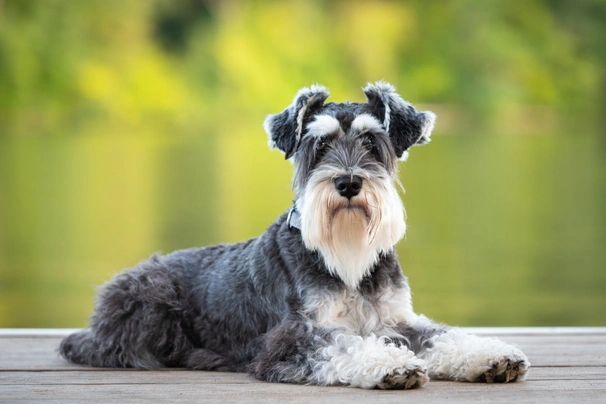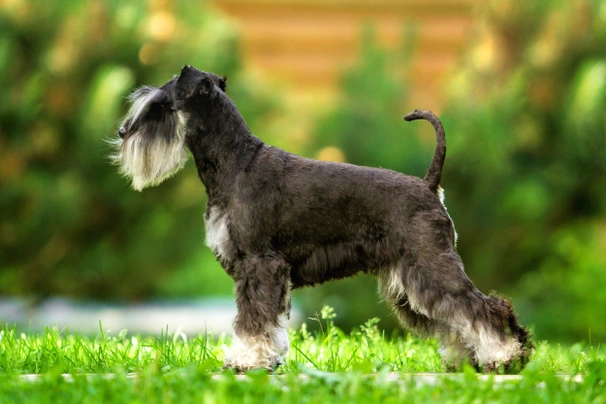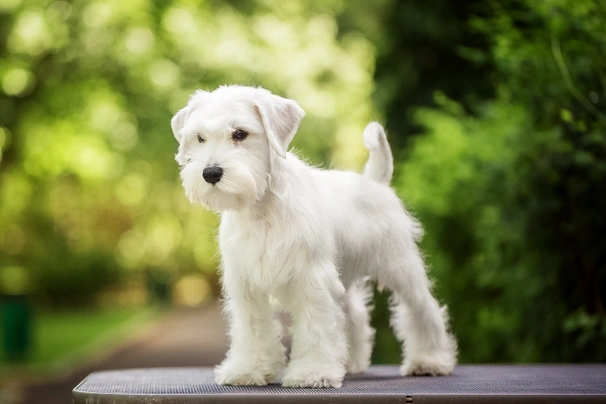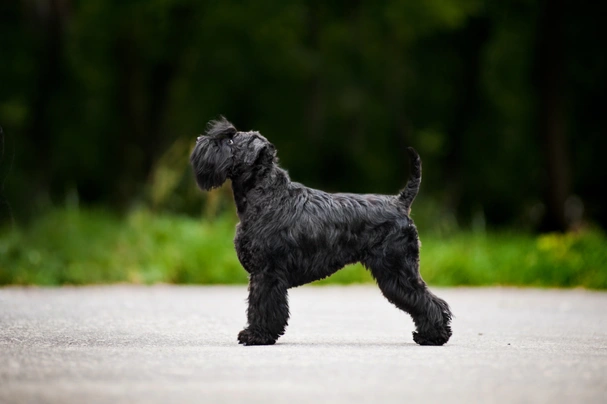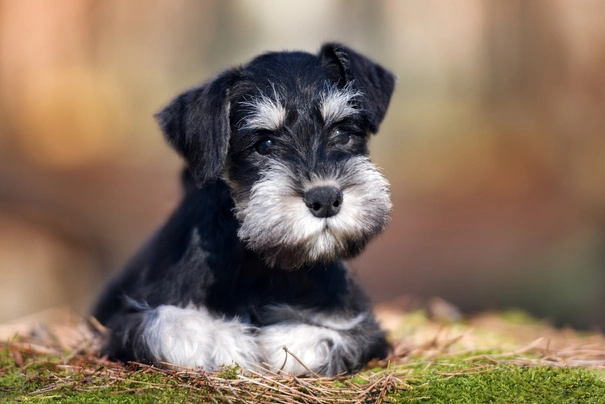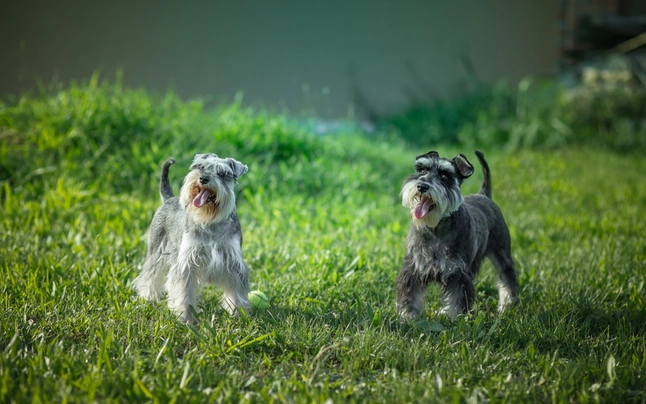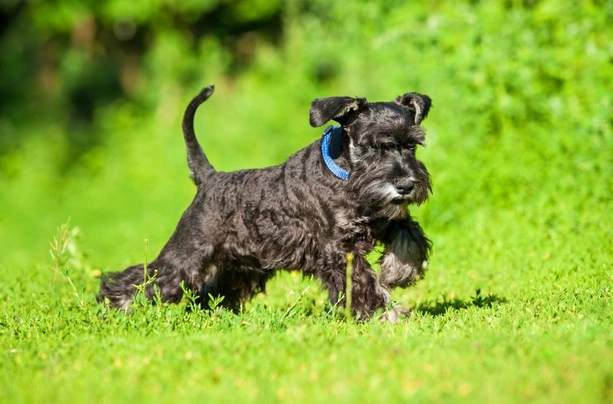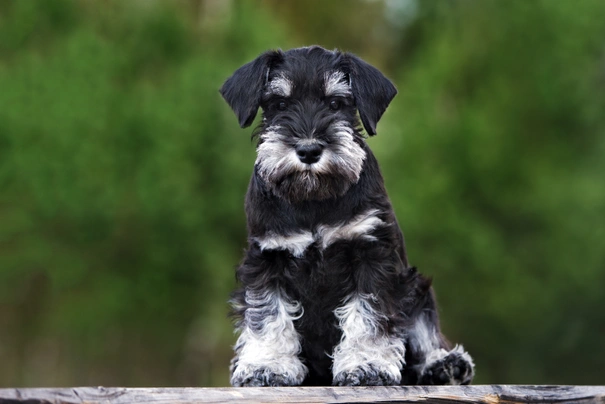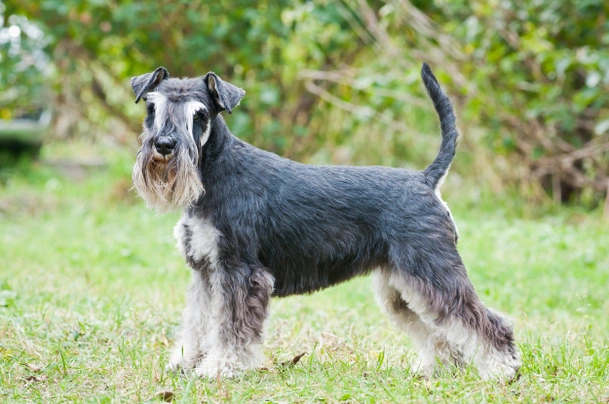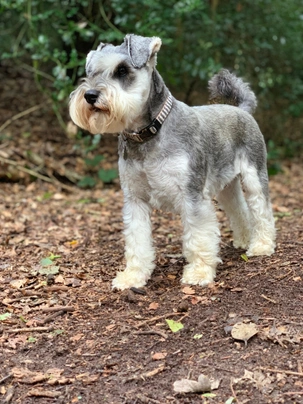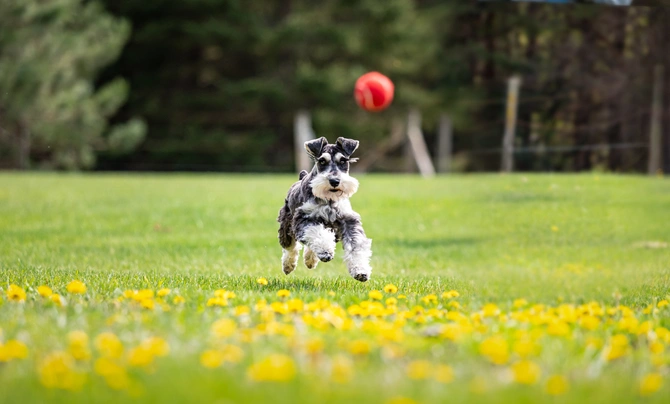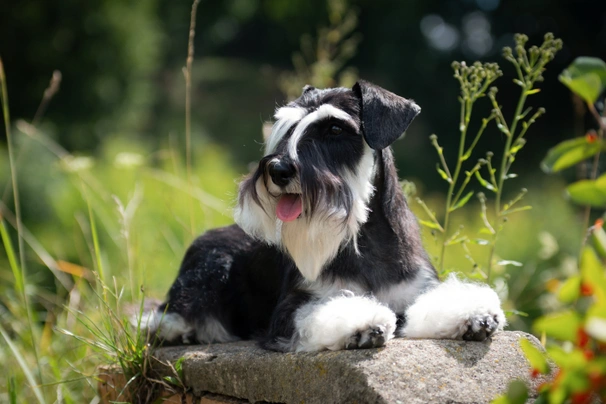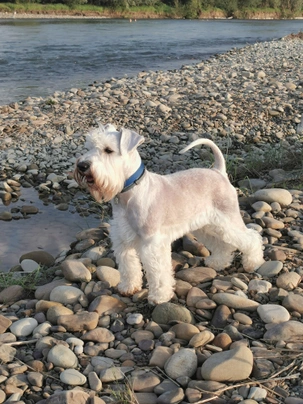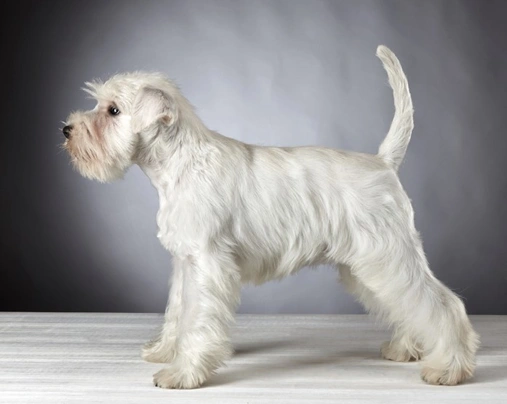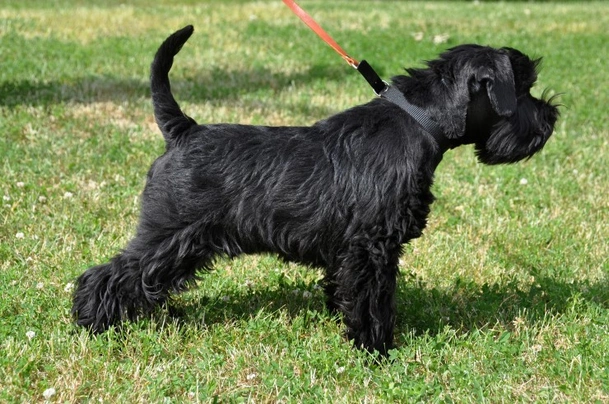Miniature Schnauzer
Pros
Cons
Introduction of the Miniature Schnauzer
The Miniature Schnauzer is a smart looking little dog that's native to Germany. They are the smallest of the three Schnauzers being the more recent addition to this charming breed. Since they first appeared in the show ring they have become one of the most popular of all the Schnauzers thanks to their size as well as their charming looks and kind loyal natures. The Miniature Schnauzer is a low shedder which is another reason why they have gained popularity not only here in the UK but elsewhere in the world too.
They are sturdy robust in appearance with an almost square look about them being just as tall as they are long. Miniature Schnauzers are very adaptable being just as happy living in an apartment as they would be living in a country house providing they are given the right amount of mental stimulation and daily exercise. Always alert and eager to please the Miniature Schnauzer is a real crowd pleaser in the showring both with audiences and judges alike.
History of the Miniature Schnauzer
The actual origins of the Miniature Schnauzer are a bit vague although the breed is thought to be an ancient one with their ancestry dating back to the 15th century. Similar dogs can be seen depicted in works of art that date back to that period in history but one thing that is certain is that they have always been highly prized in their native Germany thanks to their loyal characters even temperaments and the fact they are able to distinguish between a friend and a foe which makes them excellent watchdogs. This together with their reputation for being exceptionally good "ratters" has always meant that Schnauzers were always in demand with people who lived in the country and in towns too.
Some breed enthusiasts believe that Miniature Schnauzers were created by breeders only using the smallest examples of a Standard Schnauzer in their breeding programmes to achieve a smaller version of the breed. However other people feel they came about by crossing a Standard Schnauzer with the Affenpinscher as well as other small breeds. These charming little dogs were first exhibited at a dog show in 1899 and they were an immediate hit thanks to their size and their charming looks.
Interestingly the Schnauzer takes its breed name from a dog that won the International Show in Hanover that took place in 1879. The dog's name was "Schnauzer" and he was a wire-haired Pinscher. The name "Pinscher" was used after the first Breed Club was established in 1895 in Cologne which included the wire-haired Schnauzer as well as the smooth coated Pinscher. The name is believed to be a reference to "terrier".
However a breed standard had already been drawn up for Short-haired Pinschers around 15 years earlier which was to become the "prototype" for many German breeds. Miniature Schnauzers were officially recognised as a unique breed in 1899 in their native Germany and were first introduced to America in the mid-twenties where they were an immediate hit. In 1901 the Bavarian Schnauzer Club was founded which a few years later in 1918 joined with the Pinscher Club and became known as the Pinscher-Schnauzer Club.
Over the years the Miniature Schnauzer earned a reputation of being an excellent watchdog with the bonus being that they are not aggressive but rather very vocal "barkers" with an excellent ability of determining who was out to do mischief and who was a friend.
The breed was officially recognised by The Kennel Club in 1948 when a breed standard was established. Today Miniature Schnauzers remain a very popular choice both as companion dogs and family pets thanks to their charming looks and loyal affectionate natures both here in the UK and elsewhere in the world.
Interesting facts about the breed
- Is the Miniature Schnauzer a vulnerable breed? No they are among the most popular in the UK and elsewhere in the world
- Miniature Schnauzers were first bred to be ratters and watchdogs in their native Germany
- The breed came about by crossing Standard Schnauzers with small breeds which included the Miniature Pinschers as well as Affenpinschers and even Pomeranians and Poodles or so it is thought
- Miniature Schnauzers like their bigger cousins do not shed
- They are extremely intelligent which makes Miniature Schnauzers highly trainable
Appearance of the Miniature Schnauzer
Height at the withers: Males 30 - 36 cm Females 30 - 36 cm
Average weight: Males 5.4 - 9.1 kg Females 5.4 - 8.2 kg
The Miniature Schnauzer is a charming looking little dog with their bushy eyebrows and whiskers. They boast a compact athletic appearance with nicely proportioned heads which are a good length and quite broad between a dog's ears. Their foreheads are flat with Minis having well-muscled cheeks and a medium stop that accentuates their eyebrows. Muzzles are powerful and blunt with lots of bristly hair that forms their charming moustaches and whiskers. Noses are black with nice open nostrils and lips are tight.
Their eyes are dark and oval shaped being medium in size with dogs having lovely bushy arched eyebrows which adds to their charming appeal. Their ears are V-shaped being set high on a dog's head and dropping forward. The Miniature Schnauzer has a strong jaw with a perfect scissor bite where their upper teeth neatly overlap their lower ones. Necks are strong slightly arched and moderately long before merging cleanly into a dog's shoulders.
Minis have strong forequarters with well laid back flat shoulders and they have nice straight well-muscled front legs. Chests are deep and moderately broad with dogs having a quite noticeable breastbone that reaches as far down as the elbow. Their backs are straight and strong being slightly higher at the shoulder than over a dog's hindquarters. Loins are short and well developed with dogs having well sprung ribs.
Their hindquarters are powerful with dogs having well-muscled thighs and strong back legs with both upper and lower thighs being well developed. Feet are round and very cat-like being compact with nicely closed arched toes strong dark nails and firm black coloured pads. Their tails are set high being thicker at the base before tapering to a tip and which dogs carry straight.
When it comes to their coat the Miniature Schnauzer boasts having a harsh wiry short coat with a dense softer undercoat. The outer coat being short adds to the smart look of a Mini. The hair on a dog's neck shoulders ears and skull is clean but harsher on their legs with furnishings being thick but never silky to the touch. The accepted breed colours for registration with the Kennel Club are as follows:
- Black
- Black & Silver
- Pepper & Salt
- White
Miniature Schnauzers should always have a nice pigmentation no matter what colour coat they happen to have.
Gait/movement
When a Miniature Schnauzer moves they do so with a vigorous balanced and free-moving gait covering a lot of ground with their front legs and having excellent drive from their hindquarters. A Miniature Schnauzer always keeps a nice level back when they move.
Faults
The Kennel Club frowns on any departures or exaggerations in the breed standard and would judge any faults on how much they affect a Miniature Schnauzer's overall health and wellbeing as well as their ability to perform.
Male Miniature Schnauzers should have both testicles fully descended into their scrotums. It is also worth noting that a dog might be slightly taller or shorter and that they can be a little lighter or heavier than stated in their breed standard which is issued by the Kennel Club as a guideline only.
Temperament of the Miniature Schnauzer
Miniature Schnauzers are intelligent lively little dogs and they thrive in a home environment. However they do have a bit of a stubborn streak in them which is why their socialisation and training has to start as early as possible so they understand their place in the pack and who is the alpha dog in a household. Their training also has to be consistent and they need to be handled with a firm yet gentle hand. These little dogs are never happier than when they know who they can look to for direction and guidance.
They are quite vocal and are always very quick to let an owner know when there are strangers about or when something they don't like is going on in their environment which in short means the Mini is a good watchdog. They tend to be a little wary and aloof around people they do not know but rarely would one of these little dogs show any sort of aggression towards a stranger preferring to keep their distance and bark.
Because they are so intelligent and energetic they do well with people who lead active outdoor lives. The good news is they are not known to suffer from separation anxiety and providing they have been given enough daily exercise and things to keep their minds occupied Minis are quite happy to be left alone although never for too long.
Are they a good choice for first time owners?
Miniature Schnauzers are a good choice for first time dog owners providing the people have enough time to dedicate to socialising and training their canine companions. Miniature Schnauzers are active energetic and intelligent and they form strong bonds with their owners. However they can be stubborn and strong willed when the mood takes them which is why their education must start early and it must be consistent throughout a dog's life.
What about prey drive?
The Miniature Schnauzer was originally bred to be an expert ratter and this is a trait that is deeply embedded in a dog's psyche. In short if given the chance a Miniature Schnauzer would chase anything that moves which is why care should always be taken as to where and when a dog can run safely off their leads.
What about playfulness?
Miniature Schnauzers are smart and playful dogs by nature and thoroughly enjoy taking part in interactive games. They also excel at all sorts of canine sports which includes agility.
What about adaptability?
Miniature Schnauzers are highly adaptable little dogs and thanks to their size they are just as happy living in an apartment as they would be living in a house with a back garden providing they are given lots of daily exercise and enough mental stimulation to keep them occupied.
What about separation anxiety?
Miniature Schnauzers form extremely strong bonds with their owners and families which means they hate being left on their own for any length of time. All too often when a dog is left to their own devices they develop separation anxiety which sees them developing lots of unwanted and destructive behaviours around the home and this includes barking incessantly.
What about excessive barking?
Miniature Schnauzers are known to be "barkers" and will use any excuse to be vocal even if owners gently attempt to curb this trait when dogs are still young which is why they make great watchdogs. However incessant barking or barking for no reason can turn into a real problem more especially as it might upset and disturb neighbours.
Do Miniature Schnauzers like water?
Some Miniature Schnauzers like swimming whereas others don't even like getting their feet wet and it would be a mistake to make them go in the water when they don't want to because it would just end up frightening them. Anyone who shares a home with a Miniature Schnauzer that enjoys swimming should take great care when walking their dogs off their leads anywhere near more dangerous watercourses just in case they decide to leap in.
Are Miniature Schnauzers good watchdogs?
Throughout history the Miniature Schnauzer has always been highly prized as being an excellent watchdog. As previously mentioned although not aggressive the Schnauzer is very vocal when they are strangers about or when something they don't like is going on around them.
Intelligence / Trainability of the Miniature Schnauzer
Miniature Schnauzers are intelligent and they are always willing and eager to please which makes them easy to train. However the key to successfully training one of these active and alert dogs is to make training sessions short and extremely interesting. Longer more repetitive sessions do not bring the best out of these little dogs because they would soon lose interest in what is going on.
They are quite sensitive dogs by nature and therefore they do not respond well to any sort of harsh correction or heavier handed training methods which could end up making a dog shy and timid rather than have any positive outcomes. They do answer very well to positive reinforcement training which always brings the best out of a Miniature Schnauzer.
Puppies need to be taught the basic commands as early as possible so they understand the ground rules and it also helps a young dog establish their place in the pack. The commands a young Miniature Schnauzer should be taught are as follows:
- Come
- Sit
- Stay
- Quiet
- Leave it
- Down
- Bed
Once a dog is older they can be taught other more complicated commands to ensure they grow up to be more obedient and well-behaved.
Children and other
Miniature Schnauzers are known to be wonderful family pets being tolerant and well behaved around children of all ages. However younger children should be taught how to behave around a dog. With this said any interaction between a dog and children should always be well supervised by an adult to make sure things don't get too noisy or boisterous. This is particularly true of toddlers and younger children who may want to pull their pet around.
They also get on well with other dogs and especially if they have been well socialised from a young enough age. If they have grown up with a family cat in a household they generally get on well together however a Mini would think nothing of chasing off any other cats they come across. Care has to be taken when they are around smaller animals and pets just in case they see them as prey so any contact is best avoided.
Health of the Miniature Schnauzer
The average life expectancy of a Miniature Schnauzer is between 12 and 15 years when properly cared for and fed an appropriate good quality diet to suit their ages.
Like so many other breeds the Miniature Schnauzer is known to suffer from a few hereditary health issues which are worth knowing about if you are planning share your home with one of these active and good-looking dogs. The conditions that seem to affect the breed the most include the following:
- Mycobacterium Avian Complex (MAC) – test available
- Demyelinating Polyneuropathy – test available
- Renal Dysplasia (RD)
- Hereditary cataracts (HC) – dogs should be tested before being used for breeding purposes
- Congenital hereditary cataracts (CHC)
- Progressive retinal atrophy (PRA) – BVA/KC test available
- Persistent Mullerian Duct Syndrome (PMDS) - DNA Test Available
- Diabetes
- Urolithaisis
- Von Willebrand disease (VWD)
- Schnauzer comedone syndrome – and more specifically a form of follicular dermatitis
- Fatty Tumours
- Adenomas
More about Mycobacterium Avian Complex (MAC)
Sadly Mycobacterium Avian Complex is a fatal condition that affects dogs when they are quite young. It is a sort of "tuberculosis" and studies suggest that the condition could well be what is known as "zoonotic" which in short means it can cross from species to species including being transmitted to humans. The most susceptible being very young children and anyone who has a compromised immune system which includes the elderly. With this said there has never been a case of a person having contracted the disorder from an animal which includes from a dog to a person.
More about Demyelinating Polyneuropathy
Three years ago the mutation that causes demyelinating polyneuropathy was identified thanks to the efforts of the University of Bristol the Animal Health Trust and the University College London which now means Miniature Schnauzers can be DNA tested for the disease. It was found that the condition is an autosomal recessive disorder and that dogs typically show symptoms of having the disease when they are around 3 months old with the clinical signs getting progressively worse as time goes on.
More about Renal Dysplasia
Miniature Schnauzers are predisposed to developing renal dysplasia (RD) which is a condition that negatively impacts the development of a dog's kidneys. It is known that the disorder can either be inherited or acquired and unfortunately there is no cure and as such the prognosis for any dog diagnosed with RD is always very poor with dogs succumbing to the disorder.
More about eye issues in the breed
Miniature Schnauzers are predisposed to suffering from several eye issues which includes congenital hereditary cataracts (CHC) hereditary cataracts (HC) and progressive retinal atrophy (PRA) and because there are no DNA tests available for the breed reputable breeders and other people who intend on breeding from their dogs should have them eye-tested and to screen all litters they produce. It is mandatory for all KC Assured breeders to have stud dogs tested under the BVA/KC eye scheme and dogs should be tested annually for both HC and PRA. All Miniature Schnauzer puppies should be eye-screened by breeders for congenital hereditary cataracts between the ages of 5 - 8 weeks and before they are sold to prospective owners.
It is worth noting that dogs need to be around 6 months old and sometimes even older before they can be diagnosed as suffering from hereditary cataracts which are often referred to as "juvenile" cataracts and that all Miniature Schnauzers must be eye tested before being used for breeding purposes.
Dogs may not show any signs of suffering from progressive retinal atrophy (generalised) until they are around 1-year old although some dogs may show signs of having a problem when they are as young as 6 months old whereas others might not show any symptoms until they are 6 years old. In the Miniature Schnauzer the earliest a dog has been recorded as suffering from the condition is when the dog was 3 years old.
More about Comedone syndrome
Why some Miniature Schnauzers develop Comedone syndrome remains a mystery. The condition is also known as Schnauzer Bumps with lumps developing along a dog's spine which are frequently filled with pus when an infection takes hold. When dogs spend more time in the sunlight studies have shown they suffer fewer outbreaks of Schnauzer Bumps.
What about vaccinations?
A Miniature Schnauzer would have been given their first vaccination before being sold but it is up to their new owner to ensure they are given a follow-up shot. The vaccination schedule is as follows:
- 10 -12 weeks old bearing in mind that a puppy would not have full protection straight away but would be fully protected 2 weeks after they have had their second vaccination
There has been a lot of discussion about the need for dogs to have boosters. As such it's best to talk to a vet before making a final decision on whether a dog should continue to have annual vaccinations which are known as boosters.
What about spaying and neutering?
These days a lot of vets recommend neutering and spaying Miniature Schnauzers when they are anything from 6 to 9 months old with some vets preferring to wait until a dog has matured that much more before they undergo the procedures.
What about obesity problems?
Miniature Schnauzers are known to like their food and as such they are prone to putting on weight a little too easily. As such it's important to keep an eye on a dog's waistline and to adjust their food and daily exercise accordingly. Obesity is a real problem and can shorten a dog's life by several years.
What about allergies?
As previously mentioned Miniature Schnauzers are predisposed to suffering from a condition known as Comedone Syndrome and when an outbreak flares up the lumps along a dog's back need to be treated to avoid an infection taking hold. As such a quick trip to the vet would be in order so a dog can be examined and the right sort of treatment set in place to prevent an infection taking hold. Common triggers include the following:
- Environment
- A reaction to certain chemicals commonly found in household cleaning products
- Seasonal allergies which includes pollen and grasses
- Food which includes certain meats and cereals often used as ingredients in commercially produced dog food
- Tick and flea bites
- Dust mites
- Mould
Participating in health schemes
All responsible breeders would have their puppies eye-tested to confirm they are clear of congenital hereditary cataracts and can be tested when they are between 6 to 8 weeks old. Dams and Sires should also have been eye-tested annually to establish they are clear of hereditary cataracts congenital hereditary cataracts and progressive retinal atrophy under the BVA/KC Eye Scheme.
Miniature Schnauzers can be eye tested for hereditary cataracts when they are around 6 months old onwards although it is also possible to have a dog eye-tested for the condition when they are 2 years old too.
When it comes to progressive retinal atrophy Miniature Schnauzers can be eye-tested when they are 2 years old and onwards.
What about breed specific breeding restrictions?
Aside from the standard breeding restrictions that cover all Kennel Club registered breeds there are currently no other breed specific breeding restrictions in place for the Miniature Schnauzer.
What about Assured Breeder Requirements?
It is mandatory for all Kennel Club Assured Breeders to have stud dogs tested using the following schemes and they strongly recommend that other breeders follow suit:
- Eye testing
The Kennel Club also strongly recommends that all breeders use the following schemes before using a Miniature Schnauzer in a breeding programme:
- BVA/KC/ISDS Eye Scheme - Litter Screening
- Other schemes that are available for the breed include the following:
- DNA test - MAC
Caring for the Miniature Schnauzer
As with any other breed Miniature Schnauzers need to be groomed on a regular basis to make sure their coats and skin are kept in top condition bearing in mind that they are high maintenance on the grooming front. They also need to be given regular daily exercise to ensure they remain fit and healthy. On top of this dogs need to be fed good quality food that meets all their nutritional needs throughout their lives.
Caring for a Miniature Schnauzer puppy
Miniature Schnauzer puppies are incredibly cute and therefore is it all too easy to spoil them which is something to be avoided at all costs. Like many other breeds if a puppy gets away with too much it can lead to problems further down the line and this includes a Miniature Schnauzer growing up to be an unruly dog. With this said the timing of when a puppy is introduced to a new environment is all-important and ideally it should be when someone is going to be around for the first week or so after their arrival.
It is also essential for a home and garden to be well puppy-proofed to avoid any accidents and injuries. This means making sure all electric wires and cables are well out of the reach of a puppy because they might decide to chew on them with disastrous results. Valuable ornaments should be put away to avoid any breakages and garden tools as well as other implements should be put away. All toxic plants should be removed from the garden too.
Limiting where a puppy can roam is also a good way of keeping a puppy safe and the best way to do this is to either invest in child gates to fit on doors or to buy a well-made play pen. It is also important to set up a quiet area for a puppy to retreat to when they want to nap bearing in mind that puppies need to sleep a lot which can be anything up to 21 hours a day. The area should not be too out of the way because a puppy needs to know someone is around and so that owners can hear them should they get themselves into any sort of trouble.
The documentation a breeder provides for a puppy must have all the details of their worming date and the product used as well as the information relating to their microchip. It is essential for puppies to be wormed again keeping to a schedule which is as follows:
- Puppies should be wormed at 6 months old
- They need to be wormed again when they are 8 months old
- Puppies should be wormed when they are 10 months old
- They need to be wormed when they are 12 months old
Things you'll need for your puppy
Needless to say there are certain items that new owners need to already have in the home prior to bringing a new puppy home. It's often a good idea to restrict how much space a puppy plays in more especially when you can't keep an eye on what they get up to bearing in mind that puppies are often quite boisterous which means investing in puppy gates or a large enough playpen that allows a Miniature Schnauzer puppy the room to express themselves while keeping them safe too. The items needed are therefore as follows:
- Good quality puppy or baby gates to fit on doors
- A good well-made playpen that's large enough for a Miniature Schnauzer puppy to play in so they can really express themselves as puppies like to do
- Lots of well-made toys which must include good quality chews suitable for puppies to gnaw on bearing in mind that a puppy will start teething anything from when they are 3 to 8 months old
- Good quality feed and water bowls which ideally should be ceramic rather than plastic or metal
- A grooming glove
- A slicker brush or soft bristle brush
- Dog specific toothpaste and a toothbrush
- Scissors with rounded ends
- Nail clippers
- Puppy shampoo and conditioner which must be specifically formulated for use on dogs
- A well-made dog collar or harness
- A couple of strong dog leads
- A well-made dog bed that's not too small or too big
- A well-made dog crate for use in the car and in the home that's large enough for a Miniature Schnauzer puppy to move around in
- Baby blankets to put in your Miniature Schnauzer's crate and in their beds for when they want to nap or go to sleep at night
Keeping the noise down
All puppies are sensitive to noise including Miniature Schnauzer puppies. It's important to keep the noise levels down when a new puppy arrives in the home. TVs and music should not be played too loud which could end up stressing a small puppy out.
Keeping vet appointments
As previously mentioned a puppy would have been given their first vaccinations by the breeder but they would need to have their follow-up shot at a specific time with the schedule being as follows:
- 10 -12 weeks old bearing in mind that a puppy would not have full protection straight away but would only be fully protected 2 weeks after they have had their second vaccination
When it comes to boosters it's best to discuss these with a vet because there is a lot of debate about whether a dog really needs them after a certain time. However if a dog ever needed to go into kennels their vaccinations would need to be
What about older Miniature Schnauzers when they reach their senior years?
Older Miniature Schnauzers need lots of special care because as they reach their golden years they are more at risk of developing certain health concerns. Physically a Miniature Schnauzer will start to have a greying muzzle but there will be other noticeable changes too which includes the following:
- Coats become coarser
- A loss of muscle tone
- Miniature Schnauzers can either become overweight or underweight
- They have reduced strength and stamina
- Older Miniature Schnauzers have difficulty regulating their body temperature
- They often develop arthritis
- Immune systems do not work as efficiently as they once did which means older Miniature Schnauzers are more susceptible to infections
Older Miniature Schnauzers change mentally too which means their response time tends to be slower as such they develop the following:
- They respond less to external stimuli due to impaired vision or hearing
- They tend to be a little pickier about their food
- They have a lower pain threshold
- Become intolerant of any change
- Often an older Miniature Schnauzer can feel disorientated
Living with a Miniature Schnauzer in their golden years means taking on a few more responsibilities but these are easily managed and should include taking a look at their diet the amount of exercise they are given how often their dog beds need changing and keeping an eye on the condition of their teeth.
Older Miniature Schnauzers need to be fed a good quality diet that meets their needs at this stage of their lives all the while keeping a close eye on a dog's weight. A rough feeding guide for older Miniature Schnauzers is as follows bearing in mind they should be fed highly digestible food that does not contain any additives:
- Protein content should be anything from 14 – 21%
- Fat content should be less than 10%
- Fibre content should be less than 4%
- Calcium content should be 0.5 – 0.8%
- Phosphorous content should be 0.4 – 0.7%
- Sodium content should be 0.2 – 0.4%
Older Miniature Schnauzers don't need to be given the same amount of daily exercise as a younger dog but they still need the right amount of physical activity to maintain muscle tone and to prevent a dog from putting on too much weight. All dogs need access to fresh clean water and this is especially true of older dogs when they reach their golden years because they are more at risk of developing kidney disorders
Grooming of the Miniature Schnauzer
Miniature Schnauzers have short to medium length coats which are wiry and quite harsh to the touch. As such they need to be groomed at least twice a week to keep things tidy and tangle free. Because they have long beards it's important to clean them after a dog has eaten to prevent a build-up of food forming which can end up being quite smelly. Their coats also need to be handstripped several a year or they can be clipped which makes life a lot simpler on the grooming front. These tasks are best left to a professional dog groomer who would be able to trim a dog's nails too.
It's also important to check a dog's ears on a regular basis and to clean them when necessary. If too much wax builds up in a dog's ears it can lead to a painful infection which can be hard to clear up. In short prevention is often easier than cure when it comes to ear infections.
Exercise of the Miniature Schnauzer
The Miniature Schnauzer is a high energy intelligent little dog and as such they need to be given the right amount of daily exercise and mental stimulation for them to be truly happy well-rounded dogs. They need to be given anything from 40 to 60 minutes exercise a day with as much off the lead time as possible. If they are not given the right amount of mental stimulation and exercise every day a Miniature Schnauzer would quickly get bored and could even begin to show some destructive behaviours around the home and they may even start to suffer from separation anxiety too.
A shorter walk in the morning would be fine but a longer more interesting one in the afternoon is a must. These dogs also like to be able to roam around a back garden as often as possible so they can really let off steam. However the fencing has to be extremely secure to keep these active little dogs in because if they find a weakness in the fence they will soon escape out and get into all sorts of trouble.
With this said puppies should not be over exercised because their joints and bones are still growing. This includes not letting a dog jump up and down from furniture or going up or down the stairs. Too much pressure placed on their joints and spines at an early age could result in a dog developing serious problems later in their lives.
Feeding of the Miniature Schnauzer
If you get a Miniature Schnauzer puppy from a breeder they would give you a feeding schedule and it's important to stick to the same routine feeding the same puppy food to avoid any tummy upsets. You can change a puppy's diet but this needs to be done very gradually always making sure they don't develop any digestive upsets and if they do it's best to put them back on their original diet and to discuss things with the vet before attempting to change it again.
Older dogs are not known to be fussy eaters but this does not mean they can be given a lower quality diet. It's best to feed a mature dog twice a day once in the morning and then again in the evening making sure it's good quality food that meets all their nutritional requirements. It's also important that dogs be given the right amount of exercise so they burn off any excess calories or they might gain too much weight which can lead to all sorts of health issues. Obesity can shorten a dog's life by several years so it's important to keep an eye on their waistline from the word go.
Feeding guide for a Miniature Schnauzer puppy
Miniature Schnauzer puppies must be fed a good quality nutritious diet so they can grow and develop properly. As a rough guide a puppy can be fed the following amounts every day:
- 2 months old - 85g to 134g depending on puppy's build
- 3 months old - 95g to 157g depending on puppy's build
- 4 months old - 100g to 167g depending on puppy's build
- 5 months old - 100g to 169g depending on puppy's build
- 6 months old - 91g to 168g depending on puppy's build
- 7 months old - 82g to 152g depending on puppy's build
- 8 months old - 72g to 136g depending on puppy's build
- 9 months old - 72g to 121g depending on puppy's build
- 10 months old - 71g to 120g depending on puppy's build
Once a puppy is 11 months old they can be fed adult dog food.
Feeding guide for an adult Miniature Schnauzer
A mature Miniature Schnauzer should be fed a good quality diet throughout their lives for them to remain fit and healthy. As a rough guide a mature dog can be fed the following amounts every day:
- Dogs weighing 4 kg can be fed 74g to 86g depending on activity
- Dogs weighing 5 kg can be fed 88g to 101g depending on activity
- Dogs weighing 6 kg can be fed 100g to 116g depending on activity
- Dogs weighing 7 kg can be fed 113g to 130g depending on activity
- Dogs weighing 8 kg can be fed 124g to 144g depending on activity
- Dogs weighing 9 kg can be fed 134g to 154g depending on activity
Miniature Schnauzer price
If you are looking to buy a Miniature Schnauzer you would need to pay anything from £300 to over £1000 for a well-bred pedigree puppy. The cost of insuring a male 3-year-old Miniature Schnauzer in northern England would be £22.48 a month for basic cover but for a lifetime policy this would set you back £40.36 a month (quote as of August 2017). When insurance companies calculate a pet's premium they factor in several things which includes where you live in the UK a dog's age and whether they have been neutered or spayed among other things.
When it comes to food costs you need to buy the best quality food whether wet or dry making sure it suits the different stages of a dog’s life. This would set you back between £20 - £30 a month. On top of this you need to factor in veterinary costs if you want to share your home with a Miniature Schnauzer and this includes their initial vaccinations their annual boosters the cost of neutering or spaying a dog when the time is right and their yearly health checks all of which quickly adds up to over £800 a year.
As a rough guide the average cost to keep and care for a Miniature Schnauzer would be between £50 to £80 a month depending on the level of insurance cover you opt to buy for your dog but this does not include the initial cost of buying a well-bred pedigree Miniature Schnauzer puppy.
Buying advice
When visiting and buying any puppy or dog there are many important things to consider and questions to ask of the breeder/seller. You can read our generic puppy/dog advice here which includes making sure you see the puppy with its mother and to verify that the dog has been wormed and microchipped.
Miniature Schnauzers are an extremely popular breed both in the UK and elsewhere in the world which means that well-bred puppies command a lot of money. As such with Miniature Schnauzers there is specific advice questions and protocols to follow when buying a puppy which are as follows:
- Beware of online scams and how to avoid them. You may see online and other adverts by scammers showing images of beautiful Miniature Schnauzers puppies for sale at very low prices. However the sellers ask buyers for money up front before agreeing to deliver a puppy to a new home. Potential buyers should never buy a puppy unseen and should never pay a deposit or any other money online to a seller. You should always visit the pet at the sellers home to confirm they are genuine and make a note of their address.
- As previously touched upon Miniature Schnauzers are among the most popular breeds in the UK. As such there are many amateur breeders/people who breed from a Miniature Schnauzer far too often so they can make a quick profit without caring for the welfare of the puppies their dam or the breed in general. Under Kennel Club rules a dam can only produce 4 litters and she must be between a certain age to do so. Anyone wishing to buy a Miniature Schnauzer puppy should think very carefully about who they purchase their puppy from and should always ask to see the relevant paperwork pertaining to a puppy's lineage their vaccinations and their microchipping

Pedigree KC miniature schnauzer
£2,000
KC Reg Champion Bloodline Miniature Schnauzers
£1,500
